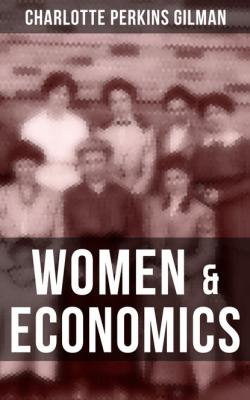ТОП просматриваемых книг сайта:
Women & Economics. Charlotte Perkins Gilman
Читать онлайн.Название Women & Economics
Год выпуска 0
isbn 9788027234875
Автор произведения Charlotte Perkins Gilman
Жанр Социология
Издательство Bookwire
Charlotte Perkins Gilman
Women & Economics
The Economic Relation Between Men and Women as a Factor in Social Evolution
Published by
Books
- Advanced Digital Solutions & High-Quality eBook Formatting -
2017 OK Publishing
ISBN 978-80-272-3487-5
Table of Contents
PROEM
In dark and early ages, through the primal forests faring, Ere the soul came shining into prehistoric night, Twofold man was equal; they were comrades dear and daring, Living wild and free together in unreasoning delight.
Ere the soul was born and consciousness came slowly, Ere the soul was born, to man and woman, too, Ere he found the Tree of Knowledge, that awful tree and holy, Ere he knew he felt, and knew he knew.
Then said he to Pain, "I am wise now, and I know you! No more will I suffer while power and wisdom last!" Then said he to Pleasure, "I am strong, and I will show you That the will of man can seize you,–aye, and hold you fast!"
Food he ate for pleasure, and wine he drank for gladness. And woman? Ah, the woman! the crown of all delight! His now,–he knew it! He was strong to madness In that early dawning after prehistoric night.
His,–his forever! That glory sweet and tender! Ah, but he would love her! And she should love but him! He would work and struggle for her, he would shelter and defend her,– She should never leave him, never, till their eyes in death were dim.
Close, close he bound her, that she should leave him never; Weak still he kept her, lest she be strong to flee; And the fainting flame of passion he kept alive forever With all the arts and forces of earth and sky and sea.
And, ah, the long journey! The slow and awful ages They have labored up together, blind and crippled, all astray! Through what a mighty volume, with a million shameful pages, From the freedom of the forests to the prisons of to-day!
Food he ate for pleasure, and it slew him with diseases! Wine he drank for gladness, and it led the way to crime! And woman? He will hold her,–he will have her when he pleases– And he never once hath seen her since the prehistoric time!
Gone the friend and comrade of the day when life was younger, She who rests and comforts, she who helps and saves. Still he seeks her vainly, with a never-dying hunger; Alone beneath his tyrants, alone above his slaves!
Toiler, bent and weary with the load of thine own making! Thou who art sad and lonely, though lonely all in vain! Who hast sought to conquer Pleasure and have her for the taking, And found that Pleasure only was another name for Pain–
Nature hath reclaimed thee, forgiving dispossession! God hath not forgotten, though man doth still forget! The woman-soul is rising, in despite of thy transgression– Loose her now, and trust her! She will love thee yet!
Love thee? She will love thee as only freedom knoweth! Love thee? She will love thee while Love itself doth live! Fear not the heart of woman! No bitterness it showeth! The ages of her sorrow have but taught her to forgive!
PREFACE
This book is written to offer a simple and natural explanation of one of the most common and most perplexing problems of human life,–a problem which presents itself to almost every individual for practical solution, and which demands the most serious attention of the moralist, the physician, and the sociologist–
To show how some of the worst evils under which we suffer, evils long supposed to be inherent and ineradicable in our natures, are but the result of certain arbitrary conditions of our own adoption, and how, by removing those conditions, we may remove the evil resultant–
To point out how far we have already gone in the path of improvement, and how irresistibly the social forces of to-day are compelling us further, even without our knowledge and against our violent opposition,–an advance which may be greatly quickened by our recognition and assistance–
To reach in especial the thinking women of to-day, and urge upon them a new sense, not only of their social responsibility as individuals, but of their measureless racial importance as makers of men.
It is hoped also that the theory advanced will prove sufficiently suggestive to give rise to such further study and discussion as shall prove its error or establish its truth.
Charlotte Perkins Stetson
Конец ознакомительного фрагмента.
Текст предоставлен ООО «ЛитРес».
Прочитайте эту книгу целиком, купив полную

